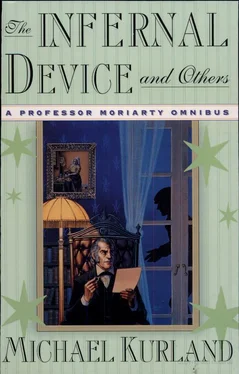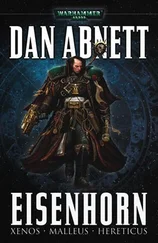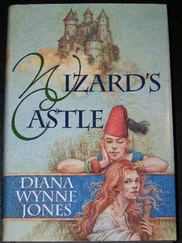"I've never even heard of anything like it," Barnett said. "Where was it made?"
"France," the old man said. "In the twenties, I think. It is signed on the bottom by Jean Eugene Robert Houdin, who served as court magician to Louis XVIII."
"Court magician?" Barnett asked. "In the eighteen twenties?"
"Oh, yes," the old man said. "Houdin was famous for his clockwork mechanisms. My father told me about them, being something of a connoisseur, as the French put it. He once made a miniature carriage, pulled by four miniature horses. And, sir, it actually worked. But this was the first thing of the sort that I've actually seen with my own eyes."
"What can you tell me about the man who pawned it?"
"Well, for one thing he wasn't French. Polish or Russian, I'd say."
"I see."
"And he was very fond of that musical box."
"But he pawned it."
"That is true. But not for anything like its true value — even in pawn. He told me he did it just to keep it safe for the next few months."
"I see," Barnett said.
"But then he came back the day before yesterday and took it out again. Told me he'd lost the ticket, which I see was the truth. I told him I remembered him, which was so, and that I'd be sorry to lose the box."
"Can you describe him for me?"
The old man considered. "I'm not much on describing the way people look," he said. "I have a picture of him in my mind's eye, don't you see, but I couldn't exactly put words to it."
"Well, was he short or tall?"
"Not too tall, I'd say."
"Young or old?"
"If I had to put a finger on it, I'd say twenty-six or seven."
"Did you happen to hear his name?"
"Hear it!" the old man snorted. "Better than that, sir; I have it written down."
"You do?" Barnett wasn't sure he should believe this stroke of luck.
"Indeed! And his address, for that matter." Barnett felt weak. "You have the man's name and address written down?"
"Naturally. You don't think I'm going to let anyone walk out of here with a pledged item and no ticket unless I get some proof of his identity, do you? I've been in this business for fifty years, and nobody has accused me of being soft in the head."
"But I thought you said you recognized him," Barnett said.
"And so I did. If not, I wouldn't have let him retrieve the object no matter how many papers he signed."
"May I get a look at the paper you had him sign?"
"Gladly. In exchange for the pledge ticket. I hate to have them outstanding, you understand."
"A fair deal," Barnett agreed.
The exchange was made and Barnett copied down the information. Not that he had any real hope that the name and address were genuine, but it was certainly worth checking out. The name and address were block-printed on a buff card. PYOTRE I. AZIMOF: 7 SCRUTTON COURT. A scrawling signature was below.
"Good-bye, sir," Barnett said. "Thank you for your assistance.
You have a fascinating shop here. I will have to come back and really wander through it someday."
"It will be here," the old man assured him. "And, for so long as I have anything to say about it, so shall I."
-
Barnett pulled his Greene's Pocket Guide to London Streets & Thoroughfares from his jacket and discovered that there indeed was a Scrutton Court, and that he was no more than seven or eight blocks from it. He resolved to scout out the building himself, without waiting to check with Moriarty, and try to get a look inside if he could think of a reasonably subtle way.
But first he would pause for a bit of lunch. While eating he would plan an approach that would be the least likely to raise suspicion. He felt it would not be wise, with Trepoff, to raise suspicion.
The Jack Falstaff Tavern on Cable Street had a pleasant grill room, and the proprietor, on hearing Barnett's accent, brought him a plate of lamb chops and grilled tomatoes, which he described for some reason as his "American lunch." It was quite good. Then, in a burst of Anglo-American friendship, the proprietor produced a pot of coffee which had been boiled only briefly and was actually drinkable.
Barnett sat over the coffee and tried to pick an approach. Building inspector? Gas-meter reader? "Excuse me, sir, but I believe my pigeon just flew in your window. Mind if I look?" Professor Moriarty would have seven acceptable schemes for getting inside the house, surely Barnett could come up with one. Barnett debated enlisting the professor's aid instead of proceeding on his own initiative, but then decided it would be more to his credit if he could prove himself an effective sleuth without help from the old master.
Barnett finished his third cup of coffee and got up. He'd check the house out from the outside. Maybe something immensely clever would occur to him as he walked by. Maybe not. Maybe there was no such house; the man had probably given a false name and address anyhow. Better check it out and see where to go from there.
Scrutton Court was a double row of two-story red brick buildings facing a narrow stone-paved street. Someone had built it early in the century as housing for the deserving almost-poor, and so it had stayed for the past sixty or seventy years. Barnett had to walk the length of the street twice before he located the building numbers, which were painted in whitewash on the curb. A row of apathetic women watched him without interest from their porches as he passed, and then went back to hanging their wash from the lines that paralleled the houses.
Dingy white curtains covered the windows at number seven, and there was no sign of life from within. What sort of sign from what sort of life Barnett had expected to see, he had no idea. The house could be deserted, or there could be an army camped within, and the only way to tell was to get inside and look.
Barnett approached the woman on the porch directly across the street from number seven. "Excuse me," he said.
She looked up, her broad face expressionless. "Aye?"
"Could you tell me if there's anyone living across the street? That building there," he pointed.
"Couldn'a say," she said.
"Well, have you seen anyone going in or out, in the past week, say?"
"Couldn'a say."
"I see," Barnett said. "Thank you so much for your help."
He crossed the street and stood in front of number seven. Then it occurred to him. The perfect approach. And it was so obvious that he was ashamed for not having thought of it immediately. Old Mr. Starkey had told him about the musical box, and he wanted to see it with an eye toward making Pyotre Azimof an offer. He knew Pyotre wouldn't sell, but surely he couldn't resist showing the musical box off to an interested collector.
Barnett mounted the stairs and knocked on the door. After some seconds, it was opened, and a burly man in rough nautical garb stared out at him.
"Good afternoon," Barnett said. "Does Mr. Pyotre Azimof live here?"
The man silently stepped aside, and Barnett walked in. "Would you tell him someone would like to see him about his musical box?" he said.
The door slammed and Barnett was grabbed from behind. A rag with sweet-smelling fluid on it was held over his mouth and nose.
"Good afternoon, Mr. Barnett," a soft, guttural voice said from further inside. "It is a shame that your friend, Professor Moriarty, did not accompany you. But you will have to suffice."
The room tilted and spun. Bright lights whirled around in Barnett's head, to be quickly replaced by harsh blackness. He struggled like a man submerged in quicksand, without really knowing what he was doing. Then nothing.
NINETEEN — THE BIG BANG
And the night shall be filled with music.
— Longfellow
Barnett woke up slowly. A syncopated pounding thrummed across his temples, and a profound nausea replaced any other sensation. For a long time nothing else mattered. And then he was very sick.
Читать дальше












